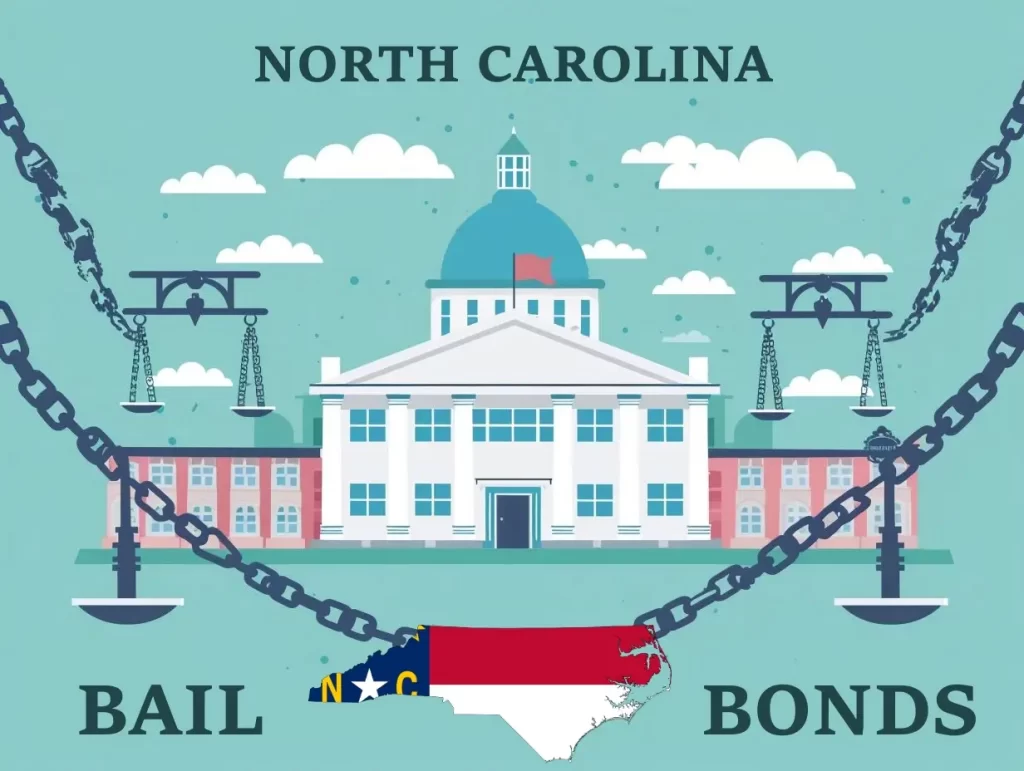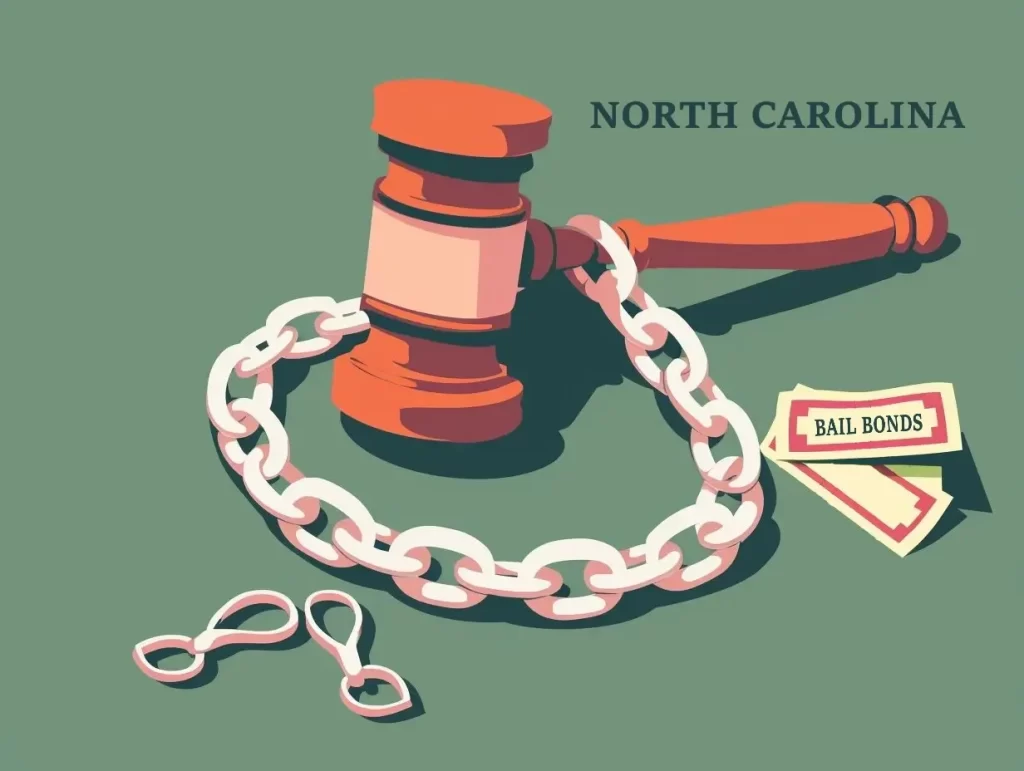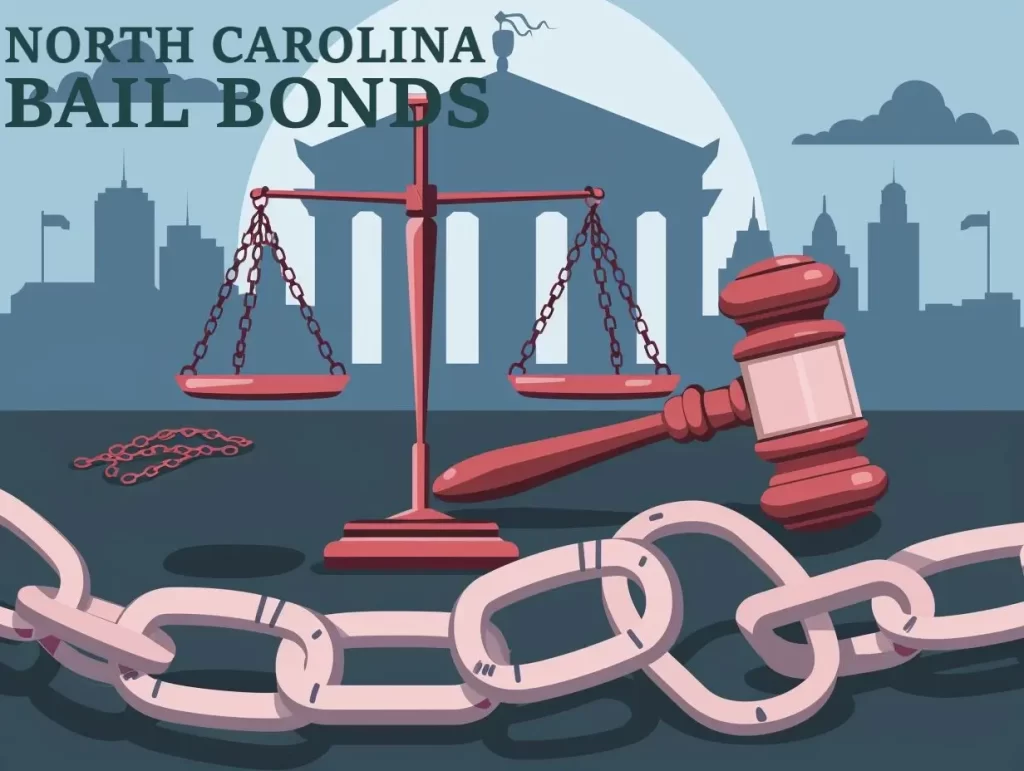Arrested in Charlotte or Raleigh and looking for “bail bonds near me”? Understanding how bail bonds work in North Carolina can be crucial in securing quick release from any city or county jail. North Carolina bail bond rates range between 10% and 20% – we’re going to show how you can make bail affordable.
A magistrate judge sets a defendant’s bail amount; the defendant then contacts a licensed North Carolina bail bondsman to obtain a bail bond. The bond company can charge the defendant between 10% and 20% of the total cash bail. Once the premium is paid, the agent may request the full bail amount in the form of collateral, usually property. Once all payments are made, the bondsman will post the defendant’s bail.
From the process of obtaining a bail bond to the cost and requirements involved, this article will guide you through the entire North Carolina bail bonds process. We go over your options for bail bond loans and provide tips on how to choose a reliable bail bond company in North Carolina near you.
Key Takeaways:
- Bail bonds are a form of payment used to secure the release of a defendant from jail in North Carolina.
- The process of obtaining a bail bond in North Carolina involves filling out paperwork, paying a fee, and meeting certain requirements.
- For those who cannot afford bail, a bail bond loan may be a viable option that can provide fast and affordable release from jail.
What are Bail Bonds?

Bail bonds are legal documents provided by a bail bond company to secure the release of a defendant awaiting trial. In North Carolina, the bail industry plays a crucial role in the pretrial release process.
These bonds serve as a financial guarantee that the defendant will appear in court when required. Should the defendant fail to appear, the bail amount is forfeited. North Carolina bail bond companies act as intermediaries between the defendant and the court, ensuring that the defendant complies with all legal obligations. In North Carolina, bail companies not only provide the financial support necessary for release but also offer valuable expertise in navigating the complex legal procedures of bonding out of jail.
How Bail Bonds Work in North Carolina?
Understanding how bail bonds work in North Carolina involves navigating the court system and following specific procedures to secure the release of a defendant. The process entails multiple steps and legal requirements. There are 3 types of bonds in North Carolina:
There are three established methods in the Tar Heel State for posting bail which include the following:
| CASH BOND: | A cash bond (or cash bail) is where the total amount is posted in US currency by the defendant, family member or friend. |
| PROPERTY BOND: | A property bond is typically when real estate property, usually the home of the defendant, family member or friend is used as a form of collateral in security the bail. Typically, the property value must be considerably higher than the bail in order for a magistrate judge to approve. |
| BAIL BONDS: | North Carolina bail bonds are the most common method of posting bail. After being arrested, most people don’t have the cash on hand or the property necessary to make bail. By paying only 10% of the cash bond, the defendant is able to use the 90% savings on a lawyer, rent, etc. This system has been in place in North Carolina, as well as the rest of the world for many decades. |
What is the Process of Obtaining a Bail Bond in North Carolina?
To obtain a bail bond in North Carolina, individuals need to contact a licensed bond agent, provide necessary information, and pay the required bail amount based on the type of bail requested. The process involves completing paperwork and meeting specific criteria set by the court.
Once the individual reaches out to a bond agent, the agent will guide them through the process and explain the different types of bail available, such as cash bail, property bond, and surety bond. Each type has its requirements and implications.
Documentation plays a crucial role in the bail bond process. The individual must provide personal details, such as their name, address, where they work, who they know and of course their contact information. Depending on the size of the bond and their criminal background, a defendant (and cosignor) may need to present collateral for certain types of bail, like property bonds.
What is the difference between bail and bond in North Carolina?
Bail is the money defendant’s pay to get out of jail, a bond is posted for a defendant by a licensed bail bonds company in North Carolina to get a defendant out of jail.
What is the Cost of a Bail Bond in North Carolina?

The cost of a bail bond in North Carolina varies based on the bail amount set by the court. Some individuals may opt for bail financing or a bail bond loan to manage the expenses, often requiring a cosigner for financial security.
Several factors contribute to the variation in bail bond costs in North Carolina. The severity of the charges, the defendant’s criminal history, flight risk potential, and often attachment to the community are key considerations that can impact the amount set by the court.
When facing high cash bail amounts, individuals may find bail bond loans to be a viable solution. Bail bond loans allow defendants and their cosignors to secure the release of their loved ones without paying the full bail upfront.
Bondsman will always require a cosigner to guarantee repayment if the defendant fails to appear in court.
What Are the Bail Amounts For Misdemeanor Charges?
Class A1 offense with a minimum punishment of 1-60 days: from $500 to $2,000
Class A1 offense with a minimum punishment of 1-45 days: from $100 to $500
Class 3 offense with a maximum punishment of 1-20: only requires a written promise; no penalty
What Are the Bail Amounts For Felony Charges?
Class A: The minimum punishment is life without parole, and the bail amount is set by the judge.
Class B1: The minimum punishment is 144 months, and the suggested amount is $200,000 to $500,000.
Class B2: The minimum punishment is 94 months, and the suggested amount is $200,000 to $500,000.
Class C: The minimum punishment is 44 months, and the suggested amount is $50,000 to $150,000.
Class D: The minimum punishment is 15 months, and the suggested amount is $50,000 to $150,000.
Class E: The minimum punishment is 15 months, and the suggested amount is $25,000 to $50,000.
Class F to I: The minimum punishment ranges from 3 to 59 months with a bail amount of $20,000 or below.
Are There Any Requirements for Obtaining a Bail Bond in North Carolina?
In North Carolina, bail bonds require meeting specific requirements such as providing complete information about the defendant, bail collateral, securing a written promise to appear in court, and obtaining approval from a magistrate or judge overseeing the case.
Need a large bond in North Carolina and have a past criminal history? Defendants may need to offer valuable collateral such as property deeds or cash. This collateral is used as security to ensure that the defendant complies with court proceedings and the rules while out on bond.
A written commitment to attend all mandatory court dates is essential, demonstrating the defendant’s willingness to fulfill their legal obligations. Interactions with magistrates or judges play a crucial role in the bail process, as their approval is vital for the release of the defendant.
Your North Carolina Bail Bondsman Needs these Details:
- Does the defendant have a permanent residence?
- Does defendant have a good family support system?
- Have they been a local resident for at least 24 months?
- Does defendant live within 45 miles of the courthouse where they must appear?
- Does defendant and cosignor work or own property?
- Does defendant have prior FTA’s, bond surrenders/revocations or fugitive status?
- Does defendant have legal residency in the United States?
- Has defendant been out of prison for at least 36 months?
- Is Defendant on probation?
How Long Does it Take to Get Someone Out of Jail with a Bail Bond?
The time-frame to secure the release of an individual from jail using a bail bond in North Carolina depends on various factors, including court appearances, bail hearings, inmate processing (mug shot, fingerprints, DNA swab, etc) and location of the jail in proximity to the bondsman. Luckily, most bondsman offer online bail bonds to speed up the bail process for faster release from jail.
Following the initial arrest, the first step is typically reaching out to a reputable bail bond agent to start the process. Once the bond is posted, the release from custody can happen within hours.
The time it takes to get a defendant released depends on the workload of the jail, the day and time. For example, on a Friday night, expect a long wait to be released as its the busiest times in Mecklenburg County Jail, Wake County Jail, Guilford County Jail, Forsyth County Jail and Cumberland County Jail.
What Happens After the Defendant is Released on Bail?

Once a defendant is released on bail through a bail bond, they are required to comply with specific bail conditions set by the court. Failure to adhere to these conditions can result in severe consequences, including skipping bail.
It’s vital for the individual to attend all scheduled court appearances as missing one could lead to serious consequences. Failure to appear can result in a warrant being issued for their arrest, and the bail bond becoming forfeited.
Common bail conditions naturally include going to all court hearings. Some conditions of bail may include regular check-ins with the bail bondsman, a probation officer, travel restrictions, electronic monitoring, drug tests and of course not committing any further crimes or interaction with police.
If a defendant fails to show up to court, a bench warrant may be issued for their arrest. When a bench warrant is issued the bondsman can then petition the court to be released from bond. This is called a bond forfeiture.
Skipping bail is a serious offense, once caught the defendant will be brought back to jail, with more charges and will need to secure additional bonds in order to get out of jail.
What Are the Conditions of Release on Bail?
In North Carolina, individuals on bond must also comply with specific conditions set by the bondsman and the court, such as drug testing, travel restrictions or regular check-ins. Non-compliance can not only lead to re-arrest but also jeopardize the chance of securing future bail.
These bail conditions aim to ensure that the individual complies with the law and does not pose a risk to public safety while out on bond and awaiting trial.
- Restrictions on travel – may limit movement to specific areas or require the surrender of passports.
- Mandatory check-ins – typically involve regular reporting to your bail bondsman, probation officer or pretrial services to monitor the defendant’s whereabouts.
- Zero interaction with law enforcement – means that a defendant will not commit any crimes while out on bond.
- No drugs or drinking – a defendant may need to submit to drug and alcohol tests while out on bond. This is especially the case where there were drugs or alcohol involved in the crime (example: DUI charges).
In some cases, the judge may impose specific legal requirements such as refraining from contacting certain individuals or attending certain events. Failure to comply with these conditions can lead to consequences such as revocation of bail or additional charges.
What Are the Consequences of Violating Bail Conditions?
Violating bail conditions in North Carolina, especially in cases involving domestic violence or assault bonds, can lead to serious legal consequences. Individuals who breach their written promise face the risk of additional charges and potential revocation of bail.
When someone is released on bail, they are required to adhere to specific conditions set by the court to ensure their compliance with the law while awaiting trial. Failure to meet these conditions, such as staying away from the victim or attending mandatory counseling sessions, can result in severe penalties. In cases of domestic violence or assault bonds, where emotions run high and tensions are elevated, any violation can escalate the situation further.
The repercussions of breaking bail conditions go beyond just legal consequences. It can damage the individual’s credibility in court and weaken their defense, leading to a less favorable outcome in their case. By disregarding the stipulations of their bail, individuals not only risk imprisonment but also strain their relationships with loved ones and undermine their chances of regaining freedom before trial.
Are There Alternatives to Bail Bonds in North Carolina?

In North Carolina, individuals seeking alternatives to traditional bail bonds may explore options such as bail bond loans, bail financing, or engaging with pretrial service agencies that offer solutions like a written promise to appear in court.
While conventional bail bonds require individuals to pay a set amount upfront, North Carolina bail bond loans provide a flexible financial solution by allowing individuals to secure their release by borrowing the required amount from a financial institution. These loans typically involve interest rates and repayment terms that the individual must adhere to.
Mostly all North Carolina bail bonds companies offer in house financing with zero interest. Since bail companies are not financial institutions, they are not allowed by law to charge an interest rate on bail loans.
If a defendant can’t afford the premium, they need to talk with their bondsman about a bail bond loan. There are always bail financing alternatives that individuals can explore to fulfill financial obligations for fast jail release. This may include seeking assistance from family and friends, utilizing personal assets as collateral, or negotiating payment plans with a bondsman.
Pretrial service agencies play a crucial role in the criminal justice system by assessing the individual’s risk level and providing recommendations for release conditions. By collaborating with these agencies, individuals can benefit from programs that focus on monitoring and support while awaiting trial, potentially avoiding the need for traditional bail bonds altogether.
What is a Bail Bond Loan?
A bail bond loan in North Carolina enables individuals to borrow funds for bail payments through licensed bail agents or commercial bail providers. Organizations like the North Carolina Bail Agents Association may facilitate bail financing for those in need.
When someone is arrested and unable to pay the full bail amount set by the court, a bail bond loan can step in as a financial tool to secure the person’s release. In North Carolina, this system works by the individual or their loved ones seeking assistance from a bail agent, who then provides a surety bond to the court on behalf of the defendant.
The defendant or their family typically pays a percentage of the total bail amount to the bail agent as a fee, which is non-refundable and acts as the agent’s profit. This fee is usually around 10% in North Carolina, but it can vary depending on the case specifics.
How Can Someone Qualify for a Bail Bond Loan in North Carolina?
Qualifying for a bail bond loan in North Carolina typically involves meeting certain criteria, having a cosigner for financial security, and providing bail collateral when required. Bail companies like those in Mecklenburg County may offer specific loan conditions.
Cosigner Bail Financing Qualifications:
Most bond companies have qualifications that must be met in order to finance bail. Keep in mind that bond companies do not charge interest on a bail loan. Here’s what most North Carolina bail bond companies require:
- Proof of Employment and open checking account
- Proof of property ownership if collateral needed
- Must be 25 years of age or older
- 12 months of continuous employment
- Utility bill showing current address
One of the key eligibility requirements for obtaining a bail bond loan in North Carolina is having a steady source of income to ensure repayment of the loan amount and associated fees. This helps lenders assess the applicant’s ability to fulfill their financial obligations.
Cosigners play a crucial role in the bail bond process, often required to step in and cover the loan if the primary borrower defaults. A cosigner with a good credit history can strengthen the application and increase the chances of approval.
In terms of collateral obligations, some cases in North Carolina may necessitate the pledge of valuable assets, such as property or vehicles, to secure the loan. This serves as a form of security for the lender in case the borrower fails to meet their obligations.
What Are the Benefits of Using a Bail Bond Loan?
Using a bail bond loan in North Carolina can offer financial flexibility and expedited release for individuals facing legal charges. Organizations in Guilford County or Forsyth County may provide tailored financing solutions to meet specific needs.
One of the key advantages of opting for a bail bond loan in North Carolina is the ability to secure the necessary funds quickly, allowing individuals to regain their freedom while their legal proceedings are ongoing. This can alleviate the stress and anxiety associated with being incarcerated, enabling individuals to focus on preparing their defense.
By working with bail companies in counties like Wake, Durham, Guilford or Forsyth, individuals can benefit from personalized financial support that takes into account their unique circumstances and resources. This can result in more manageable payment plans and 0% interest rates, making the overall process of obtaining a bail bond loan more affordable and accessible.
How to Choose a Reliable Bail Bond Company in North Carolina?
Selecting a trustworthy bail bond company in North Carolina involves researching licensed bond agents, reviewing customer testimonials, and considering factors like responsiveness and reputation. Entities in cities such as Raleigh and Charlotte may offer reliable services.
When choosing a bail bond company, it is crucial to ensure that all agents are fully licensed and accredited by the state. Licensed agents possess the necessary knowledge and experience to navigate the complexities of the bail bond process efficiently.
Checking customer feedback and testimonials can provide valuable insights into the company’s reputation and the quality of service they offer. Responsive communication and a stellar reputation are also key indicators of a reputable bail bond agency, as they demonstrate a commitment to assisting clients promptly and professionally.
Want more info about a bondsman in Charlotte, High Point, Winston-Salem, Raleigh or other city in NC, please contact https://www.ncbaa.com/
Frequently Asked Questions
What are bail bonds and how do they work in North Carolina?
Bail bonds in North Carolina are a type of financial guarantee that allows individuals to be released from jail while awaiting their court trial. Bail bonds work by paying a percentage of the total bail amount, typically 10%, to a bail bondsman who will then post the full bail amount on behalf of the defendant.
What is the process of obtaining a bail bond in North Carolina?
To obtain a bail bond in North Carolina, you will need to first find a reputable bail bondsman. The bail bondsman will ask you to provide information about the defendant, including their name, charges, and bail amount. You will also need to pay the bail bond fee, which is typically 10% of the total bail amount.
Can I get a bail bond loan in North Carolina?
Yes, you can get a bail bond loan in North Carolina to help pay for the bail bond fee. These loans are typically provided by bail bond companies or third-party lenders and require the defendant or their family member to provide collateral, such as property or a vehicle.
What happens if the defendant fails to appear in court while out on bail in North Carolina?
If the defendant fails to appear in court while out on bail, called Failure to Appear (FTA), the bail bondsman will hire a bounty hunter to bring the defendant back to jail. If the defendant (the skip) is not located within a certain time period, the bondsman is responsible for paying the full bail amount to the court. The bail bondsman will then seek reimbursement from the defendant or their family, and may also use the collateral provided for the bail bond loan.
Are there any restrictions on who can post a bail bond in North Carolina?
In North Carolina, anyone who is at least 18 years old with a valid government-issued ID and the ability to pay the bail bond fee can post a bail bond on behalf of a defendant. However, some bail bond companies may have their own requirements for cosigners or collateral.
Can I get a refund for the bail bond fee if the charges against the defendant are dropped in North Carolina?
You are not eligible for a refund of the bail bond premium even if the charges against the defendant are dropped. You have essentially purchased a service fee whereby you did not need to come up with 100% of the cash bond.
How do I look up court cases in North Carolina?
Court cases in North Carolina can be accessed online via https://www.nccourts.gov/going-to-court or by visiting the Clerk of Court’s office and using the self-service terminal in any of the 100 counties in North Carolina.
I paid full cash bail to Mecklenburg County, when the case is finished do I get a refund?
If you posted 100% cash bail to the county, then yes, you are entitled to a refund. No matter if you are found guilty, innocent or charges were dropped or dismissed, you’ll get a refund. But, the county will deduct court costs and fines and send a check for the remainder.
Once the case is complete will I owe the county or the bondsman?
You won’t owe the bondsman any money, but you may owe the county. Depending on the county, they may charge court costs, paperwork fees, jail fees and of course any fines associated with your guilty plea or verdict.
